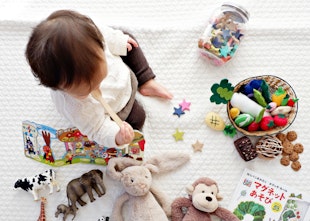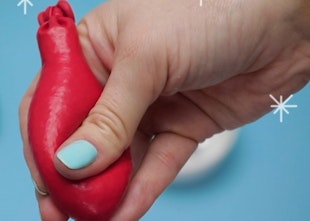For the first couple of weeks of your baby’s life, they will only be able to see things that are quite close to their face – just enough to clearly see the face of the person holding them.
For the first couple of weeks of your baby’s life, they will only be able to see things that are quite close to their face – just enough to clearly see the face of the person holding them.
As they develop, they begin to focus their attention on objects that are further away. They will begin to follow moving objects from about three months old and by this stage, a full range of colours will be available for them to enjoy.
By seven to eight months your baby will show more interest in different shapes and objects as their
sight fully matures. This usually coincides with them taking a keen interest in colourful toys that have interesting patterns and shapes on offer.
Your baby’s sight is an incredibly valuable resource. It helps them navigate the world, recognise those that they can trust and it is strongly connected to the social and emotional skills they will require later in life.
Before you know it, your baby will be recognising faces from afar, pointing at the objects they want to hold and waving hello and goodbye at times that actually make sense. It is amazing to see this sense unfold and notice your baby visually embrace the world around them.
Eye contact is very important for your baby’s
development. It starts in the very early days as your baby gazes up at you while you are feeding them. The ability to focus on one thing and pay attention will be required for later in life during school and adult life and this is where the skill begins its journey. The baby is looking at you while focusing on the mouth movements needed to effectively transport the milk to their tummies.
Eye contact is also emotionally important because it helps your baby form a bond of attachment and trust. They will soon come to look at your responses and reactions as an indicator regarding whether something is safe, fun, exciting or sad which is really quite amazing.
There are many social reasons why eye contact is important for our children too. It will affect their relationships as holding someone’s gaze has so many benefits both professionally and through friendships. Many people consider eye contact to be an art, and the fact that so many people find it uncomfortable is really interesting.
When your child is of school going age you will want them to look at their teacher when they are addressing your child. You will want them to look at you and listen when you are explaining something or asking them to do something. If they naturally look down or at the wall beside you it can be really frustrating and concerning because their attention is not where it should be in that moment. Using eye contact from a young age will really help with this.
Eye contact will also play a major role in how the way your baby learns how to speak. It starts with your baby using their gaze to share important information with you as a parent. Have you ever picked up that your baby is hungry, tired or wants a particular toy just by noticing a certain way that they looked at you? Your baby has come to notice that this communication really works.
In later months when the parent and the baby are looking at the same object, and sharing that experience, the parent can begin to name the object. This is where your infant’s association with language and objects will begin. The connection between what they see and a word has been born.






